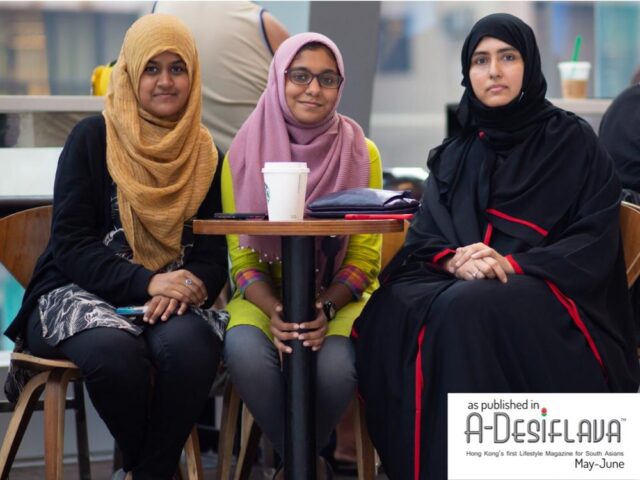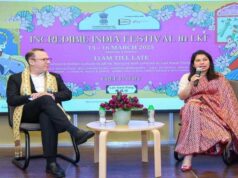The beauty of diversity, especially in our city, is that it allows us to experience life with refreshingly new perspective from time to time. Brinda Khandwala had the unique opportunity to interact with three amazing women who choose to wear their faith in their fashion
I met with the ‘hijab brigade’, as I like to call them, over coffee and a conversation that remains amongst my most memorable ones. Samu Fathima, a homemaker and mother of two girls, Zarifa Sheik, Chemistry teacher at HKUGA College and Zulaiha Zulfika, first year BSc. student at CUHK were casually dropping wisdom bombs at every odd question of mine.
Let’s start from the start – I first saw Zarifa and Zulaiha at their community’s sports event where the duo was volunteering on the mic and score board along with many others. My initial reaction was that of surprise, owing to years of stereotyping set in the mind, to see hijab-clad women out and active on the field. I took a moment to reset the mind with – hey, why the surprise!
These girls are as modern as any other in Hong Kong. Their values, upbringing and education – just as solid. Then why judge them by their garb and not their gumption?
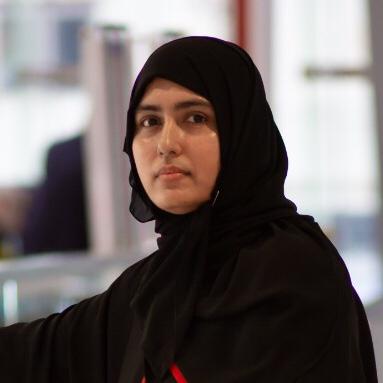
Samu Fathima
So, few weeks later I met them, more to clear my own judgmental thinking, and otherwise to share their perspective with you. From the quaint town at the very south of India, Kayalpatnam, Fathima, a graduate in Computer Science, came to Hong Kong 17 years ago after her marriage to Mr. Seyed Ismail. She has two daughters, ages 16 and eight. She explained, “The literal translation of hijab is ‘barrier’ or ‘covering’.” Fathima reveals that as a child she dreamt of being a doctor. After her graduation and marriage, she continued doing online courses and hoped to make a career in computer programming. But with time and responsibilities, her plans for life changed. Her passion for learning led her to study and gain deeper understanding of the Islamic scriptures.
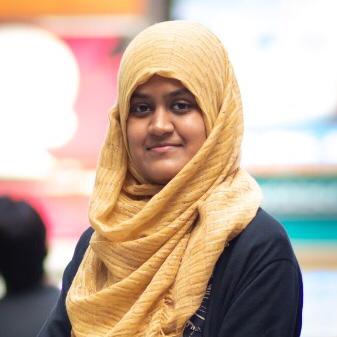
Zarifa Sheik
If we were to judge by looks again, Zarifa looks like a teen. But she’s a teacher. The ‘no nonsense’ type. She says she prefers the old school ways when students took notes instead of screenshots and the computer was meant for research and not games. She works hard on her lesson plans, often taking work back home. But there’s no complains. “Compared to other countries, Hong Kong pays teachers well,” she says. And to let her secret out – she thoroughly understands Cantonese! So, when she’s commuting or when her students are chatting, she picks up on their talks without letting them know. Sometimes it’s comments about her, and she lets it pass. “But once a student was talking about me, and I had to let him know that I understood every nasty thing he said. After that, the word kind of spread that I can understand their language, so no one has spoken anything ill around me.”
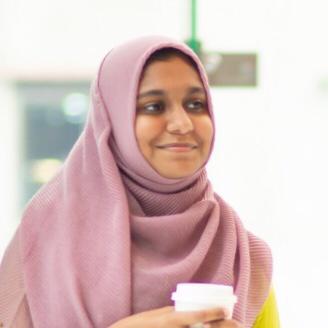
Zulaiha Zulfika
And then there’s Zulaiha, the little firecracker who says things that can go down as famous quotes! Carefully listening to all my questions, giving is due thought, she makes profound and thought-provoking statements. She hopes to be an educator someday but isn’t rushed into deciding anything yet. Every day she spends a few minutes mulling over which hijab goes well with her outfit-of-the-day. “Yes, major fashion choices are made around it. It’s a chore to look through what you have and match your hijab around it. We all have more hijabs that clothes!” she laughs.
From what age have you been wearing the hijab?
Zulaiha: We’re supposed to start wearing after puberty – so by age 10 or 11 most of us are wearing it. Before that I wore it to special occasions and while going to the mosque, out of respect. But unlike most others, I started wearing it sooner than I was asked to. A lot of my friends were wearing it, so I wanted to too. In fact, my mom was like – ‘eventually you have to wear it for all your life then why start early’! I may not have understood its entire significance then. But I have been attending religion classes where we are taught its importance and now it’s a part of my identity.
What is the significance of wearing the hijab? Are you in agreement with it?
Fathima: When I started wearing it, back in India, it was because all the women in the house – my mother, my aunts, wore it. I then learned that we are instructed by our lord to do so, as a means for fulfilling his commandment for ‘modesty’. The quran talks about it in chapter 24 verse 31 and chapter 33 verse 59. Today, I see the benefits – it protects us from harm and abuse. And lessens incidents of harassment in public places.
Do you remember ever resisting it?
Zarifa: Yes, at the beginning when I was asked to wear it to school. Not many of my community friends had started wearing it at that time. So, I felt awkward, only in that area – in school, being the only one wearing it. Imagine one day you’re not wearing something and the next day onwards you have to. Like everything new, I remember questioning it at that time but still obeying. It felt like having two identities – one with the community kids where I would love to wear it and another at school where I felt is it necessary, especially during sports. I was resisting internally. But that was then. Now if I were to step out without it, I’d be totally freaked out!
Fathima: Yes! I’d feel undressed.
Do you wear it because you’re religious?
Zarifa: Just because you’re wearing the hijab, doesn’t necessarily mean you’re very faithful. You may not be wearing one and still be religious. You can be modern and religious. Often we see girls wearing it in front of their families and then taking it off once they’re out.
Zulaiha: That’s when they feel forced into it. Some of my friends are rebellious or lack confidence in wearing the hijab. Parents are more accepting in allowing them time to decide but the community puts pressure. Personally, the religion classes have a major impact in my life. It’s a beautiful scene to witness – community people of all ages gather. Those couple of hours that some words of wisdom go in my head has helped shape who I am.
Is there lack of freedom of choice?
Zarifa: I don’t think freedom of choice is based on a piece of cloth. It may seem like our women don’t have freedom because women in the past weren’t allowed to educate themselves. The Indian culture masks religion. Religion by itself is never against education. But parents nowadays are more open-minded.
Fathima: Liberty isn’t about revealing your body. In fact, loose, modest clothing helps in prevention of objectification of women.
Your garment instantly reveals your identity. Are you okay with that?
Zarifa: Of course, I do understand that when people see me in a hijab they assume I am Muslim. It’s a nice way to preach your religion. When you’re seen showing kindness or doing charity, it speaks well about your religion.
Have you ever been made to feel a misfit in Hong Kong?
Zulaiha: Never. Hong Kong is a much more accepting place than other foreign cities. But it is funny how we are too much of a Hong Konger for India and too Indian for Hong Kong. When we go back to our hometown, which is near Chennai, we are a little foreign for them. And it’s the same here. So, it’s like we remain a little foreign for both places.
Fathima: Its nice when people are accepting your choice even when the may not agree or understand. I’ve never felt isolated here.
Do you miss out on fashion trends?
Fathima: We are against that standard of feminine beauty which demands exposure. For us, fashion is in choosing the patterns and colours of our hijab and burkha.
How to you face discrimination?
Zulaiha: There are a lot of ways we are all boxed into categories anyway. If not for the hijab it’ll be for our skin colour. An added layer of judgement doesn’t bother me personally. For me, it’s a constant reminder of my faith. It keeps me aware of how I act with my friends, especially the opposite gender.
Does it keep you on your path of god?
Fathima: Yes, it shows our submission to god. We feel close to Allah by obeying his instruction. Its not only in Islam but other religions and cultures of the world too where women are to wear loose clothing. Like even in Christianity, nuns dress a certain way.
Zulaiha: If a nun or sister is to dress like that, they are seen as being on the path of their religion. Then when I wear the hijab, why criticize?
Is it that Muslims are more religious that other faiths?
Zarifa: I think Muslim women practice their religion more. Like in Christianity we usually just see nuns and sisters in modest clothing. I don’t know why that is. Maybe the women want to fit into the modern world in that way.
Fathima: The hijab doesn’t stop us from being modern – participating in the community, studying, having a career… there are so many success stories of hijab-wearing women.
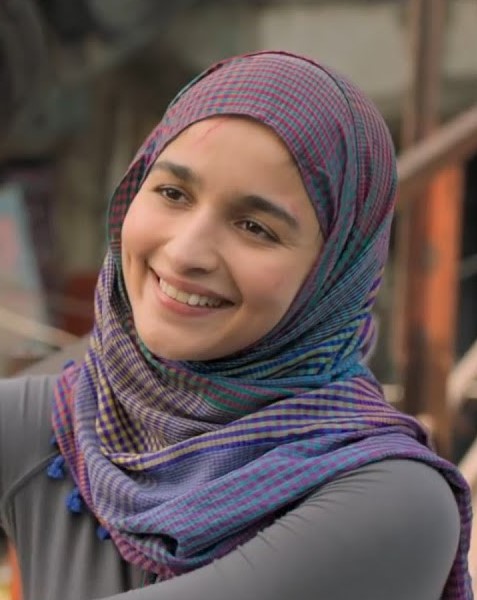
What are your thoughts on a hijabi leading lady (Alia Bhatt as Safeena) in the recent Bollywood blockbuster – Gully Boy?
Zulaiha: Growing up, I longed to see women, like actresses or ones in the public eye, acting or doing what they do in their hijab. It’s nice to have that representation. It’s easier for people to accept something if they see other people doing it. Having such movies or tv show presentations would’ve made life a lot easier. Even if Muslim actresses now would act with their hijab more, it would give me more confidence that I can look good wearing an additional piece of clothing over my head. Maybe Alia Bhatt’s representation serves as an encouragement to young girls to wear the hijab. Instead of seeing this piece of clothing as something that oppresses us, people will accept it as a part of us. Because a more and more hijabi women are breaking the glass ceiling. These movies are showing inclusive and accepting to races we are all becoming now.
On a lighter note, do you ever miss showing off hairstyles?
Fathima: We definitely do different hairstyles but the difference is that we don’t show those. Girls at their young age of 9 or 10 cover their head and it becomes a part of their identity. Even if some young girls from a practicing Muslim community miss showing their hair, they eventually know about the significance of hijab as they get older.
Zarifa: I don’t really miss doing hairstyle and to show them to strangers. I still get the chance to show off my hairstyles to my significant others. I actually enjoy the fact that sometimes I don’t need to style my hair, and no one will know!
Zulaiha: Sometimes it is depressing when we go to gatherings and parties where people show off their hairstyles where we cover up our hair. But then we know we are doing this for god. We also understand it isn’t necessary that you show your hair to look beautiful or feel beautiful. If you’re beautiful on the inside, that beauty will illuminate on the outside. Sometimes it’s a pity that you have pretty hair but you can’t show it but then again, I never have a bad hair day! I’ve never felt too bad about it. It doesn’t feel like a disadvantage. In fact, I am at an advantage because people look at me for who I am and not for my exterior.
Pictures by Azake Rahman
(as published in A-DesiFlava May-June 2019 issue)


